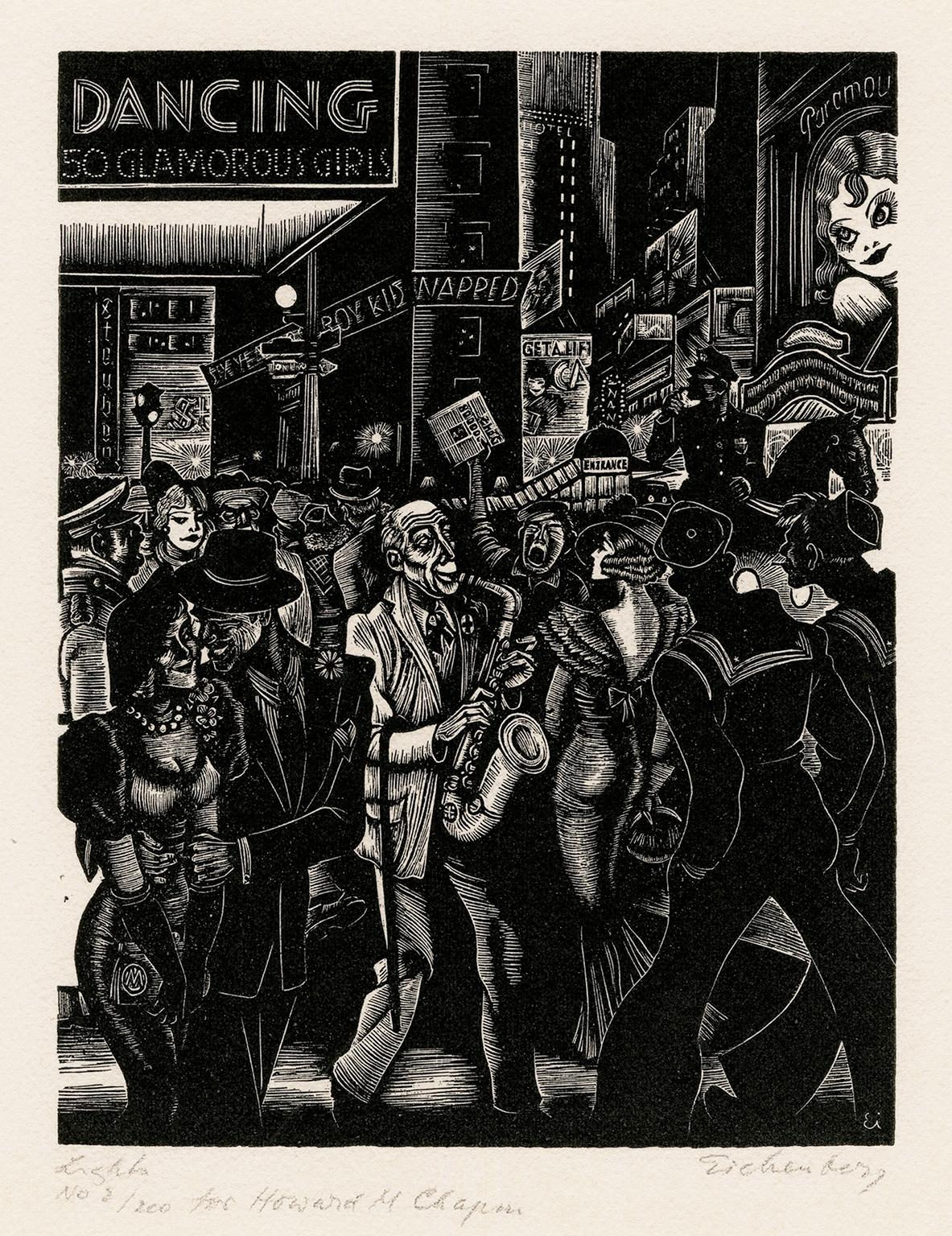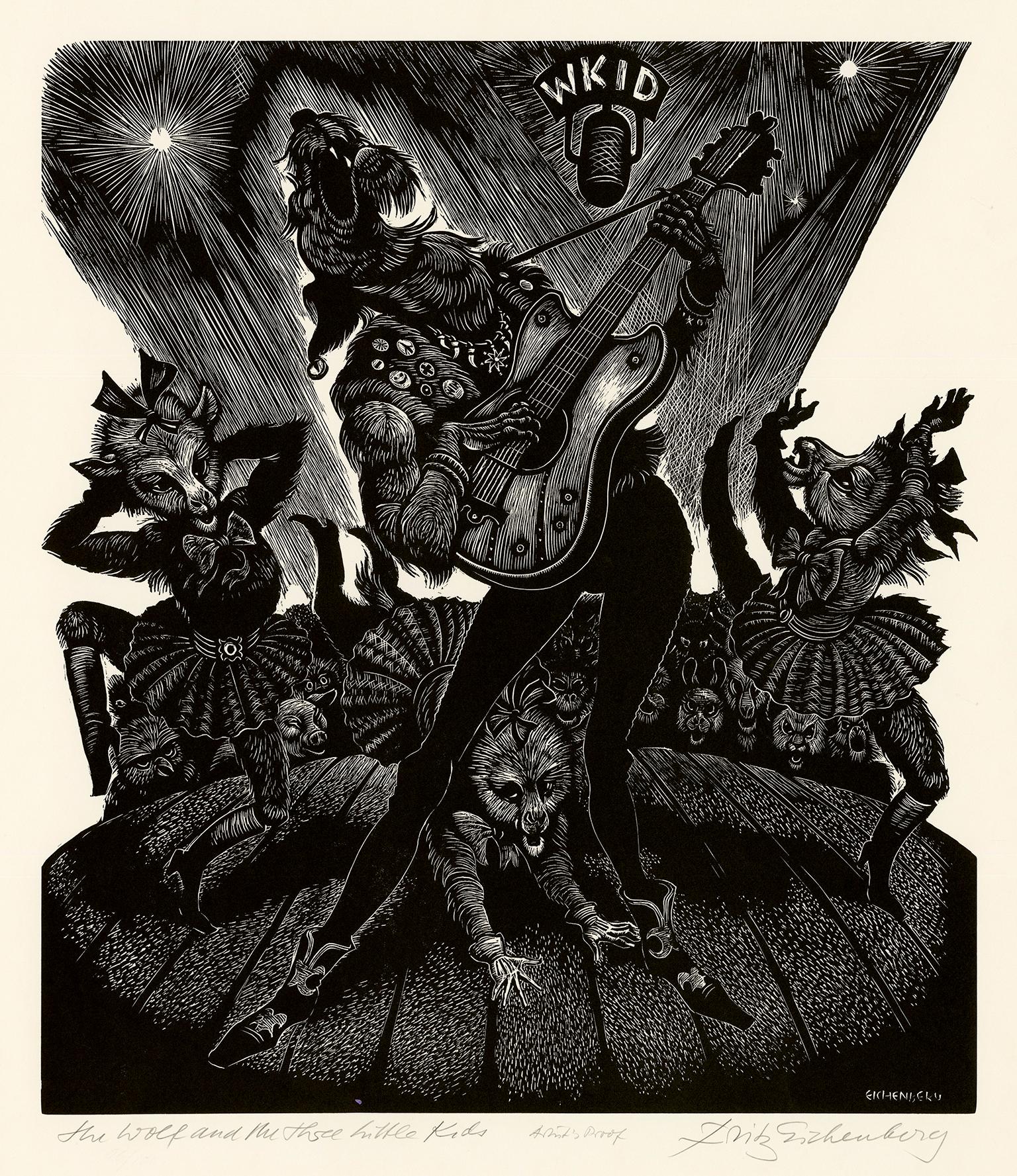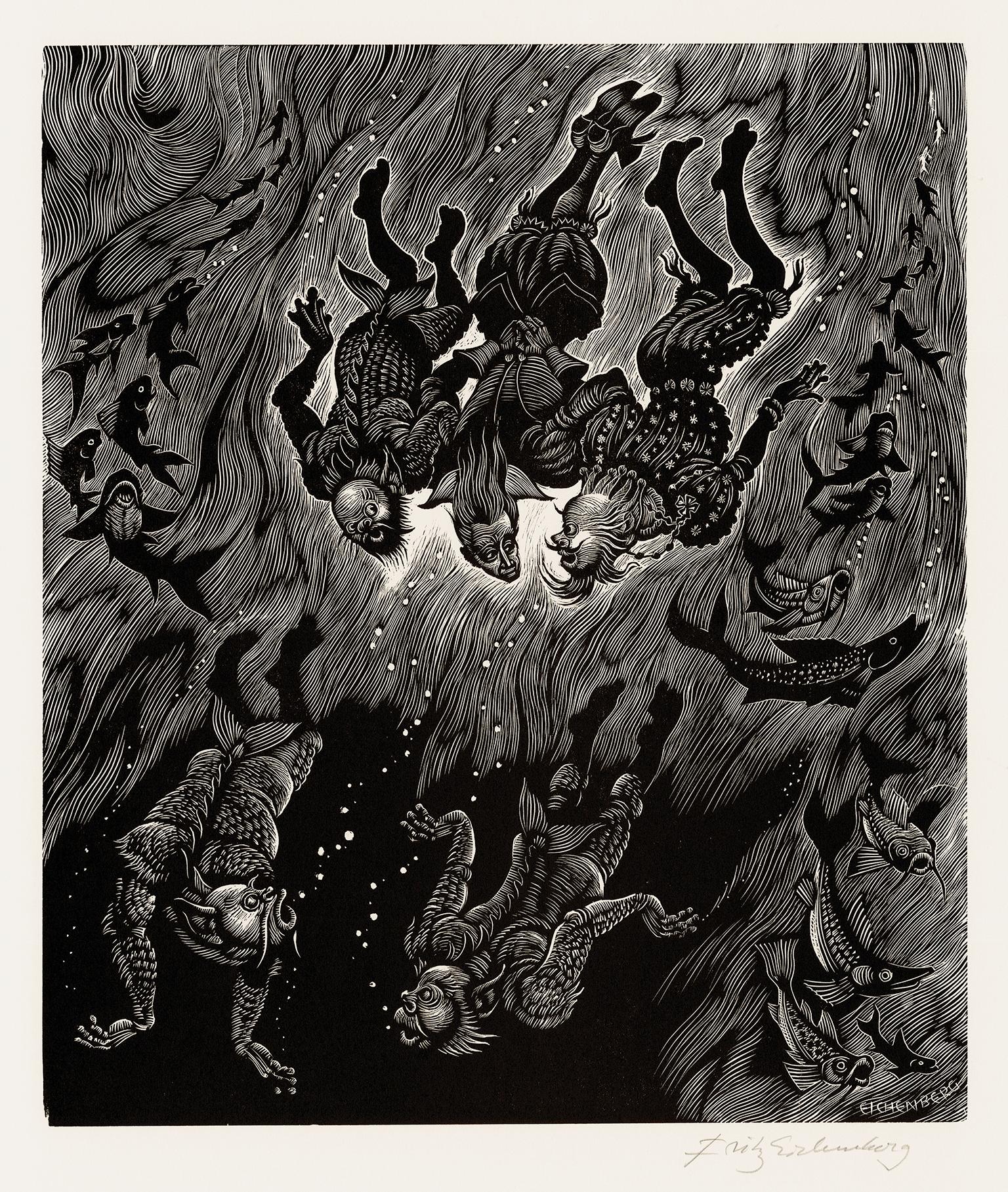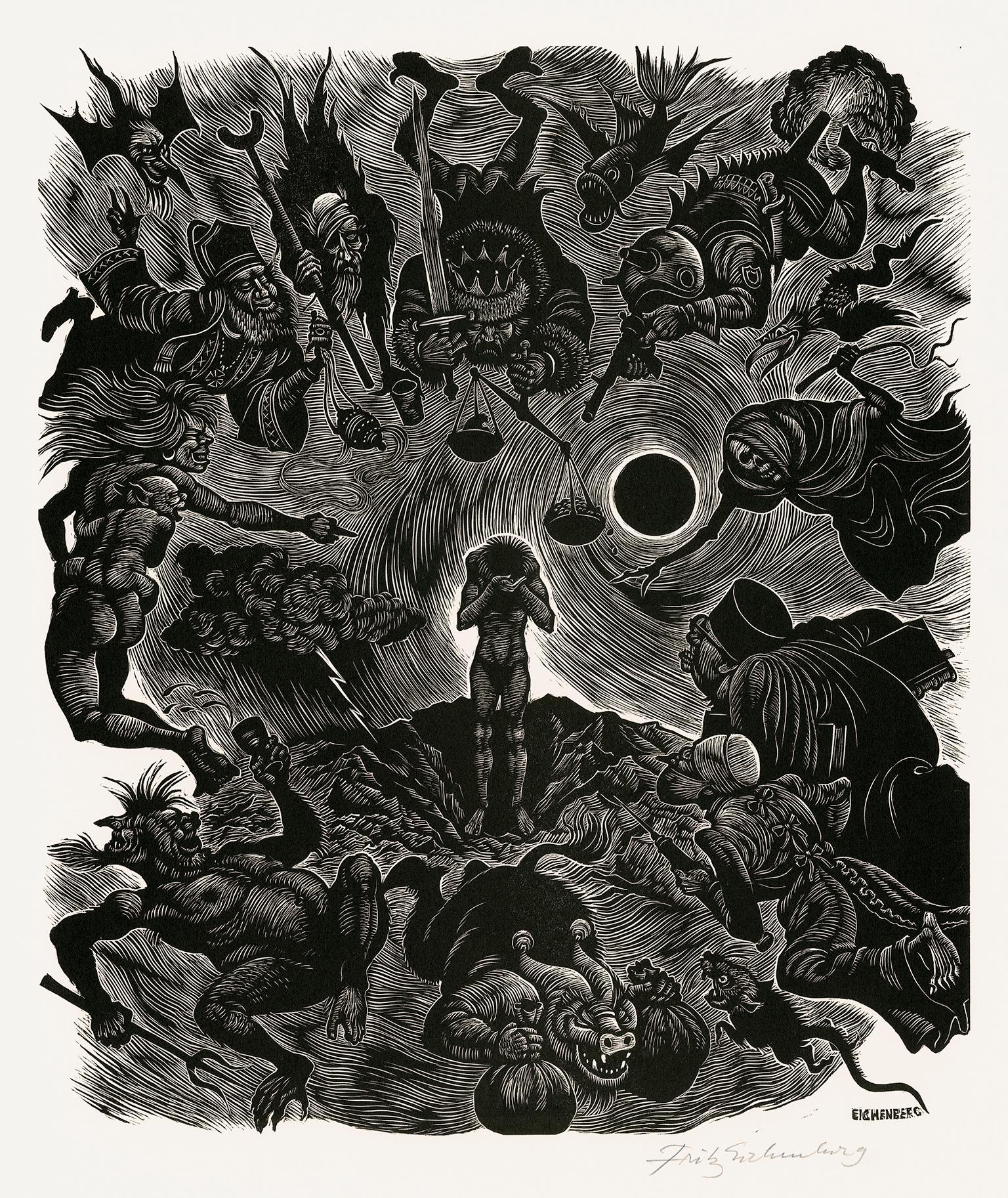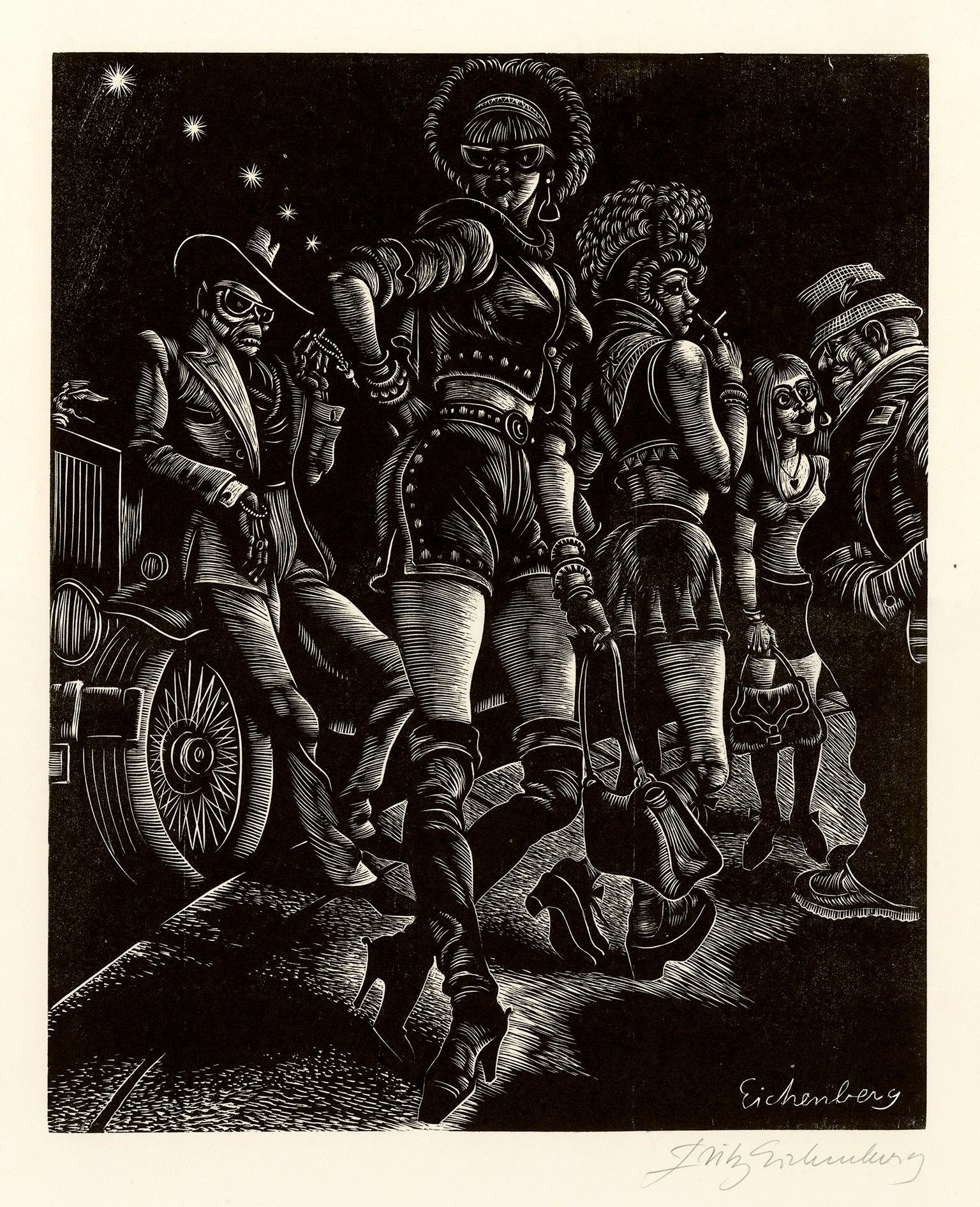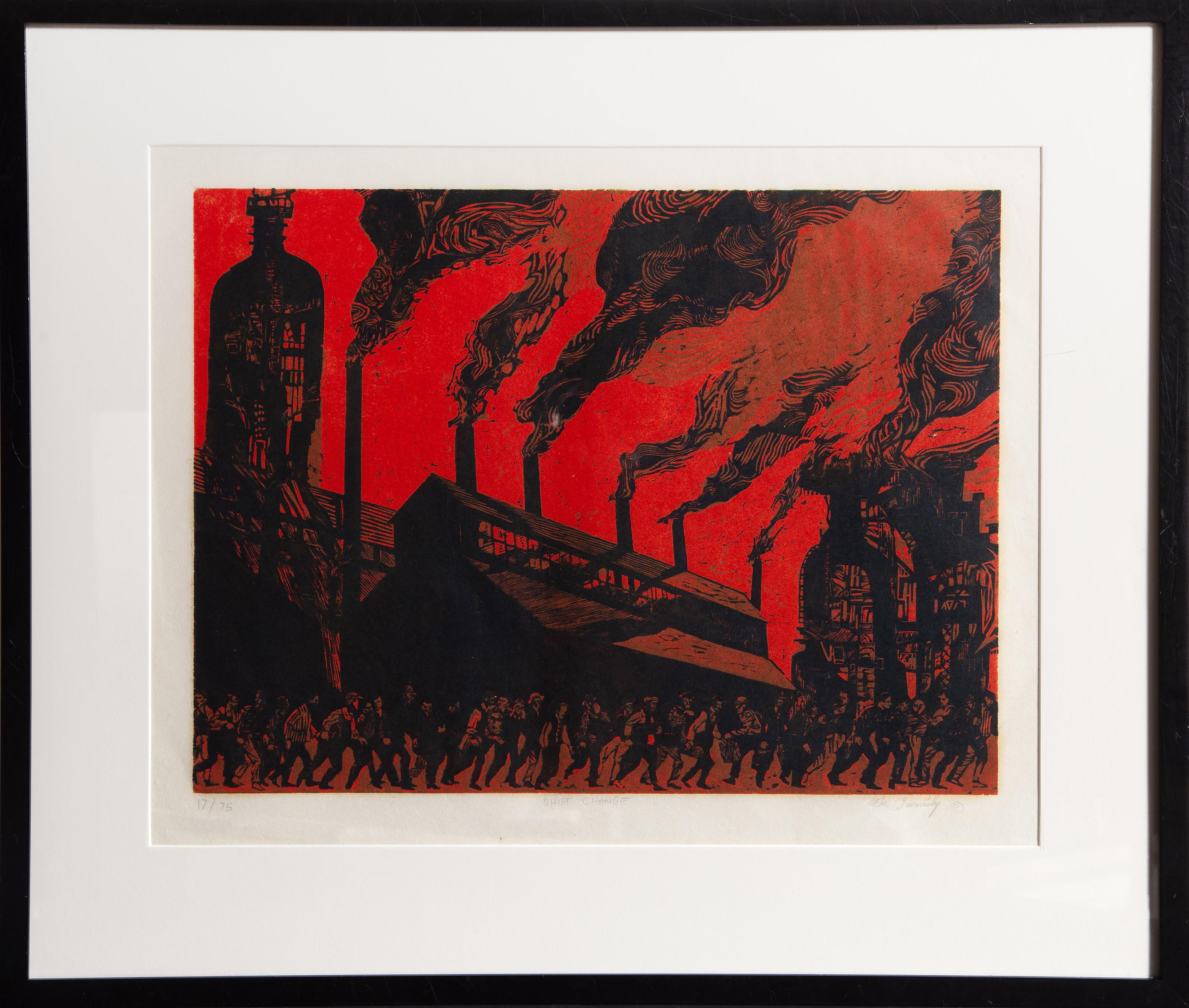Milton AveryNIGHT NUDE1953
1953
About the Item
- Creator:Milton Avery (1885 - 1965, American)
- Creation Year:1953
- Dimensions:Height: 16 in (40.64 cm)Width: 30 in (76.2 cm)Depth: 2 in (5.08 cm)
- Medium:
- Movement & Style:
- Period:
- Condition:The print has been inspected outside the frame, and is free of any damage, fading, foxing or other defect. The framing elements are archival.
- Gallery Location:Portland, ME
- Reference Number:
Milton Avery
Milton Clark Avery was born in 1885 in Altmar, New York. Largely self-taught, Avery is today regarded as one of the great early modern American artists; his inspired palette, simplified forms and unwavering commitment to a figurative tradition have secured him a place not only in the canon but also in the hearts of the American public.
Always at odds with the dominant style of the time, be it the American Scene Painting and Social Realism of the 1930s and '40s or the Abstract Expressionism of the 1950s, Avery's oeuvre is a labor of singular dedication. As a boy, Avery worked factory jobs to help support his large family following their move to Connecticut in 1898. He did not seriously begin to pursue art until sometime following his father's death in 1905, when he intermittently attended classes at the Connecticut League of Art Students. He made his artistic debut in 1915 at the Wadsworth Atheneum's Fifth Annual Exhibition of Oil Painting and Sculpture.
In 1925 Avery relocated to New York to be closer to his future bride. Following his marriage in 1926 he was able to quit working and paint full time. At this time Avery replaced the light-drenched palette of his Hartford days with more muted tones. He also exchanged his heavy impasto for thin washes of pigment, which he used to create veiled fields of color.
In 1927 Avery exhibited with the Society of Independent Artists. Success quickly followed. Two of his paintings were selected for inclusion in a 1928 group show at the Opportunity Gallery in New York. Also in 1928, renowned collector Louis Kaufman became the first person to purchase a painting by the artist; and in 1929 Duncan Phillips purchased Winter Riders (1929) for the Phillips Memorial Gallery, making it Avery's first painting to enter a museum collection.
Avery's signature figurative style characterized by simple forms and flattened shapes filled with arbitrary color "in the manner of Matisse" was fully developed by the 1940s. His work as a colorist greatly influenced succeeding generations of artists, specifically Color Field painters Mark Rothko, Barnett Newman, and Adolph Gottlieb. In 1944 he was given his first solo museum exhibition at the Phillips Memorial Gallery. That same year, he entered into a contract with famed dealer Paul Rosenberg, in which Rosenberg agreed to purchase 25 of Avery's paintings twice a year.
In 1952 the Baltimore Museum of Art hosted Avery's first museum retrospective, and Avery was the subject of a major article in Arts magazine by eminent art critic Clement Greenberg. In 1960 the Whitney Museum of American Art hosted his second museum retrospective.
Find authentic Milton Avery prints and paintings on 1stDibs.
(Biography provided by Helicline Fine Art)
- ShippingRetrieving quote...Ships From: Portland, ME
- Return PolicyA return for this item may be initiated within 10 days of delivery.
- AT THE SEASHOREBy Will BarnetLocated in Portland, MEBarnet, Will. AT THE SEASHORE. Szoke 69, Cole 68, Johnson 54. Woodcut printed in black, brown and white, 1939. There was no edition, only a few proofs printed by the artist on Japane...Category
1930s American Modern Figurative Prints
MaterialsWoodcut
- CHILD REACHINGBy Will BarnetLocated in Portland, MEBarnet, Will. CHILD REACHING. Szoke 83, Cole 82, Johnson 65. Woodcut, 1940. Edition of 25. Titled and signed in pencil. 7 1/4 x 11 1/4 inches (image), 8 1/8 x 11 1/2 inches (sheet). ...Category
1940s American Modern Figurative Prints
MaterialsWoodcut
- SLEEPING MAN (REST)By Will BarnetLocated in Portland, MEBarnet, Will. SLEEPING MAN (REST). Szoke 42, Cole 41, Johnson 40. Woodcut, 1937. Edition of 10. Titled "Sleeping Man" at left, and signed at right, both in pencil. This print is usua...Category
1930s American Modern Figurative Prints
MaterialsWoodcut
- SPEAKING OF CHILDREN and PTA FRIEND'S SEMINARYBy Peggy BaconLocated in Portland, MEBacon, Peggy. SPEAKING OF CHILDREN and PTA FRIEND'S SEMINARY. Flint 120. Etching, 1933, together with a preparatory drawing, titled "PTA Friend's Seminary." The etching titled, dated an signed in pencil. The edition size is not known, but likely small as the print is uncommon; there are no auction...Category
1930s American Modern Figurative Prints
MaterialsEtching
- THE CLINICBy Peggy BaconLocated in Portland, MEBacon, Peggy. THE CLINIC. Flint 109. Drypoint, 1932. Edition size not known, but likely very small as the print is rare. 4 15/16 x 6 7/8 inches, plus wide margins (the sheet is 11 x ...Category
1930s American Modern Figurative Prints
MaterialsDrypoint
- UNTITLED (WOMAN WEAVING)By Jehuda WallersteinerLocated in Portland, MEWallersteiner, Jehuda Isaraeli 1915-2004). UNTITLED (WOMAN WEAVING). Woodcut in colors, not dated. Edition of 85. 38 x 26 inches.Signed in pencil and numbered. Framed, .Materials
Color, Woodcut
- 'City Lights' — Vintage Wood Engraving, New York City, 1934By Fritz EichenbergLocated in Myrtle Beach, SCFritz Eichenberg, 'City LIghts', wood engraving, 1934, edition 200. Signed, titled 'Lights', and annotated 'No 2/200 for Howard M. Chapin' in pencil. Initialed in the block, lower right. A fine, richly-inked black impression, on cream wove paper, with full margins (1 1/4 to 1 7/8 inches); a small loss (5/8 inch) in the top right sheet corner, well away from the image, otherwise in excellent condition. Printed by master printer Ernest Roth...Category
1930s American Modern Figurative Prints
MaterialsWoodcut
- 'The Wolf and the Little Kids' — Graphic ModernismBy Fritz EichenbergLocated in Myrtle Beach, SCFritz Eichenberg, 'The Wolf and the Little Kids' from the suite 'Fables with a Twist', wood engraving, 1975-76, artist's proof apart from the edition of c. 50. Signed, titled, and annotated 'Artist’s Proof' in pencil. Signed in the block, lower right. A fine, richly-inked impression, on cream wove paper, with full margins (7/8 to 1 1/2 inches), in excellent condition. Complete with vellum folder with descriptive text in red and black linotype. Printed by master printer Harold McGrath at The Gehenna Press, Northampton, MA. Image size 13 15/16 x 12 1/8 inches (354 x 308 mm); sheet size 16 1/2 x 14 inches (419 x 356 mm). Archivally sleeved, unmatted. Collection: Harvard Museums. ABOUT THE ARTIST Fritz Eichenberg (1901–1990) was a German-American illustrator and arts educator who worked primarily in wood engraving. His best-known works were concerned with religion, social justice, and nonviolence. Eichenberg was born to a Jewish family in Cologne, Germany, where the destruction of World War I helped to shape his anti-war sentiments. He worked as a printer's apprentice and studied at the Municipal School of Applied Arts in Cologne and the Academy of Graphic Arts in Leipzig, where he studied under Hugo Steiner-Prag. In 1923 he moved to Berlin to begin his career as an artist, producing illustrations for books and newspapers. In his newspaper and magazine work, Eichenberg was politically outspoken and sometimes wrote and illustrated his reporting. In 1933, the rise of Adolf Hitler drove Eichenberg, who was a public critic of the Nazis, to emigrate with his wife and children to the United States. He settled in New York City, where he lived most of his life. He worked in the WPA Federal Arts Project and was a member of the Society of American Graphic Artists. In his prolific career as a book illustrator, Eichenberg portrayed many forms of literature but specialized in works with elements of extreme spiritual and emotional conflict, fantasy, or social satire. Over his long career, Eichenberg was commissioned to illustrate more than 100 classics by publishers in the United States and abroad, including works by renowned authors Dostoyevsky, Tolstoy, Charlotte and Emily Brontë, Poe, Swift, and Grimmelshausen. He also wrote and illustrated books of folklore and children's stories. Eichenberg was a long-time contributor to the progressive magazine The Nation, his illustrations appearing between 1930 and 1980. Eichenberg’s work has been featured by such esteemed publishers as The Heritage Club, Random House, Book of the Month Club, The Limited Editions Club, Kingsport Press, Aquarius Press, and Doubleday. Raised in a non-religious family, Eichenberg had been attracted to Taoism as a child. Following his wife's unexpected death in 1937, he turned briefly to Zen Buddhist meditation, then joined the Religious Society of Friends in 1940. Though he remained a Quaker until his death, Eichenberg was also associated with Catholic charity work through his friendship with Dorothy Day...Category
1970s American Modern Figurative Prints
MaterialsWoodcut
- 'A Visit to the King of the Waters' — Graphic ModernismBy Fritz EichenbergLocated in Myrtle Beach, SCFritz Eichenberg, 'A Visit to the King of the Waters' from the suite 'The Adventurous Simplicissimus', wood engraving, 1977, artist's proof apart from the edition of 50. Signed in pencil. Signed in the block, lower right. A fine, richly-inked impression, on cream wove paper, with full margins (1 1/2 to 2 inches), in excellent condition. Image size 14 x 12 inches (356 x 305 mm); sheet size 17 1/2 x 15 inches (445 x 381 mm). Archivally sleeved, unmatted. ABOUT THIS WORK 'Simplicius Simplicissimus' (German: Der abenteuerliche Simplicissimus Teutsch) is a picaresque novel of the lower Baroque style, written in five books by Hans Jakob Christoffel von Grimmelshausen published in 1668, with the sequel Continuatio appearing in 1669. The novel is told from the perspective of its protagonist Simplicius, a rogue or picaro typical of the picaresque novel, as he traverses the tumultuous world of the Holy Roman Empire during the Thirty Years' War. Raised by a peasant family, he is separated from his home by foraging dragoons. He is adopted by a hermit living in the forest, who teaches him to read and introduces him to religion. The hermit also gives Simplicius his name because he is so simple that he does not know his own name. After the death of the hermit, Simplicius must fend for himself. He is conscripted at a young age into service and, from there, embarks on years of foraging, military triumph, wealth, prostitution, disease, bourgeois domestic life, and travels to Russia, France, and an alternate world inhabited by mermen. The novel ends with Simplicius turning to a life of hermitage, denouncing the world as corrupt. ABOUT THE ARTIST Fritz Eichenberg (1901–1990) was a German-American illustrator and arts educator who worked primarily in wood engraving. His best-known works were concerned with religion, social justice, and nonviolence. Eichenberg was born to a Jewish family in Cologne, Germany, where the destruction of World War I helped to shape his anti-war sentiments. He worked as a printer's apprentice and studied at the Municipal School of Applied Arts in Cologne and the Academy of Graphic Arts in Leipzig, where he studied under Hugo Steiner-Prag. In 1923 he moved to Berlin to begin his career as an artist, producing illustrations for books and newspapers. In his newspaper and magazine work, Eichenberg was politically outspoken and sometimes wrote and illustrated his reporting. In 1933, the rise of Adolf Hitler drove Eichenberg, who was a public critic of the Nazis, to emigrate with his wife and children to the United States. He settled in New York City, where he lived most of his life. He worked in the WPA Federal Arts Project and was a member of the Society of American Graphic Artists. In his prolific career as a book illustrator, Eichenberg portrayed many forms of literature but specialized in works with elements of extreme spiritual and emotional conflict, fantasy, or social satire. Over his long career, Eichenberg was commissioned to illustrate more than 100 classics by publishers in the United States and abroad, including works by renowned authors Dostoyevsky, Tolstoy, Charlotte and Emily Brontë, Poe, Swift, and Grimmelshausen. He also wrote and illustrated books of folklore and children's stories. Eichenberg was a long-time contributor to the progressive magazine The Nation, his illustrations appearing between 1930 and 1980. Eichenberg’s work has been featured by such esteemed publishers as The Heritage Club, Random House, Book of the Month Club, The Limited Editions Club, Kingsport Press, Aquarius Press, and Doubleday. Raised in a non-religious family, Eichenberg had been attracted to Taoism as a child. Following his wife's unexpected death in 1937, he turned briefly to Zen Buddhist meditation, then joined the Religious Society of Friends in 1940. Though he remained a Quaker until his death, Eichenberg was also associated with Catholic charity work through his friendship with Dorothy Day...Category
1970s American Modern Figurative Prints
MaterialsWoodcut
- 'Simplicius' Farewell to the World' — Graphic ModernismBy Fritz EichenbergLocated in Myrtle Beach, SCFritz Eichenberg, 'Simplicius’ Farewell To The World' from the suite 'The Adventurous Simplicissimus', wood engraving, 1977, artist's proof apart from the edition of 50. Signed in pencil. Signed in the block, lower right. A fine, richly-inked impression, on cream wove paper, with full margins (1 1/2 to 2 inches), in excellent condition. Image size 14 x 12 inches (356 x 305 mm); sheet size 17 1/2 x 15 inches (445 x 381 mm). Archivally sleeved, unmatted. ABOUT THIS WORK 'Simplicius Simplicissimus' (German: Der abenteuerliche Simplicissimus Teutsch) is a picaresque novel of the lower Baroque style, written in five books by Hans Jakob Christoffel von Grimmelshausen published in 1668, with the sequel Continuatio appearing in 1669. The novel is told from the perspective of its protagonist Simplicius, a rogue or picaro typical of the picaresque novel, as he traverses the tumultuous world of the Holy Roman Empire during the Thirty Years' War. Raised by a peasant family, he is separated from his home by foraging dragoons. He is adopted by a hermit living in the forest, who teaches him to read and introduces him to religion. The hermit also gives Simplicius his name because he is so simple that he does not know his own name. After the death of the hermit, Simplicius must fend for himself. He is conscripted at a young age into service and, from there, embarks on years of foraging, military triumph, wealth, prostitution, disease, bourgeois domestic life, and travels to Russia, France, and an alternate world inhabited by mermen. The novel ends with Simplicius turning to a life of hermitage, denouncing the world as corrupt. ABOUT THE ARTIST Fritz Eichenberg (1901–1990) was a German-American illustrator and arts educator who worked primarily in wood engraving. His best-known works were concerned with religion, social justice, and nonviolence. Eichenberg was born to a Jewish family in Cologne, Germany, where the destruction of World War I helped to shape his anti-war sentiments. He worked as a printer's apprentice and studied at the Municipal School of Applied Arts in Cologne and the Academy of Graphic Arts in Leipzig, where he studied under Hugo Steiner-Prag. In 1923 he moved to Berlin to begin his career as an artist, producing illustrations for books and newspapers. In his newspaper and magazine work, Eichenberg was politically outspoken and sometimes wrote and illustrated his reporting. In 1933, the rise of Adolf Hitler drove Eichenberg, who was a public critic of the Nazis, to emigrate with his wife and children to the United States. He settled in New York City, where he lived most of his life. He worked in the WPA Federal Arts Project and was a member of the Society of American Graphic Artists. In his prolific career as a book illustrator, Eichenberg portrayed many forms of literature but specialized in works with elements of extreme spiritual and emotional conflict, fantasy, or social satire. Over his long career, Eichenberg was commissioned to illustrate more than 100 classics by publishers in the United States and abroad, including works by renowned authors Dostoyevsky, Tolstoy, Charlotte and Emily Brontë, Poe, Swift, and Grimmelshausen. He also wrote and illustrated books of folklore and children's stories. Eichenberg was a long-time contributor to the progressive magazine The Nation, his illustrations appearing between 1930 and 1980. Eichenberg’s work has been featured by such esteemed publishers as The Heritage Club, Random House, Book of the Month Club, The Limited Editions Club, Kingsport Press, Aquarius Press, and Doubleday. Raised in a non-religious family, Eichenberg had been attracted to Taoism as a child. Following his wife's unexpected death in 1937, he turned briefly to Zen Buddhist meditation, then joined the Religious Society of Friends in 1940. Though he remained a Quaker until his death, Eichenberg was also associated with Catholic charity work through his friendship with Dorothy Day...Category
1970s American Modern Figurative Prints
MaterialsWoodcut
- 'The Pimp' — Graphic ModernismBy Fritz EichenbergLocated in Myrtle Beach, SCFritz Eichenberg, 'The Pimp', wood engraving, 1980, artist's proof before the edition. Signed in pencil. Signed in the block, lower right. A fine, richly-inked impression, on cream wove paper, with full margins (2 3/16 to 3 1/2 inches), in excellent condition. Archivally sleeved, unmatted. Image size 12 x 9 3/4 inches (305 x 248 mm); sheet size 18 x 14 inches (457 x 356 mm). ABOUT THE ARTIST Fritz Eichenberg (1901–1990) was a German-American illustrator and arts educator who worked primarily in wood engraving. His best-known works were concerned with religion, social justice, and nonviolence. Eichenberg was born to a Jewish family in Cologne, Germany, where the destruction of World War I helped to shape his anti-war sentiments. He worked as a printer's apprentice and studied at the Municipal School of Applied Arts in Cologne and the Academy of Graphic Arts in Leipzig, where he studied under Hugo Steiner-Prag. In 1923 he moved to Berlin to begin his career as an artist, producing illustrations for books and newspapers. In his newspaper and magazine work, Eichenberg was politically outspoken and sometimes wrote and illustrated his reporting. In 1933, the rise of Adolf Hitler drove Eichenberg, who was a public critic of the Nazis, to emigrate with his wife and children to the United States. He settled in New York City, where he lived most of his life. He worked in the WPA Federal Arts Project and was a member of the Society of American Graphic Artists. In his prolific career as a book illustrator, Eichenberg portrayed many forms of literature but specialized in works with elements of extreme spiritual and emotional conflict, fantasy, or social satire. Over his long career, Eichenberg was commissioned to illustrate more than 100 classics by publishers in the United States and abroad, including works by renowned authors Dostoyevsky, Tolstoy, Charlotte and Emily Brontë, Poe, Swift, and Grimmelshausen. He also wrote and illustrated books of folklore and children's stories. Eichenberg was a long-time contributor to the progressive magazine The Nation, his illustrations appearing between 1930 and 1980. Eichenberg’s work has been featured by such esteemed publishers as The Heritage Club, Random House, Book of the Month Club, The Limited Editions Club, Kingsport Press, Aquarius Press, and Doubleday. Raised in a non-religious family, Eichenberg had been attracted to Taoism as a child. Following his wife's unexpected death in 1937, he turned briefly to Zen Buddhist meditation, then joined the Religious Society of Friends in 1940. Though he remained a Quaker until his death, Eichenberg was also associated with Catholic charity work through his friendship with Dorothy Day...Category
1980s American Modern Figurative Prints
MaterialsWoodcut
- Shift Change, Social Realist Woodblock Print by Mike GoscinskyLocated in Long Island City, NYShift Change Mike Goscinsky, American (1933–2021) Woodblock on thin wove paper, signed, titled and numbered in pencil Edition of 15/75 Image Size: 14 x 19 inches Size: 22 x 26.5 in. ...Category
1990s American Modern Landscape Prints
MaterialsWoodcut
